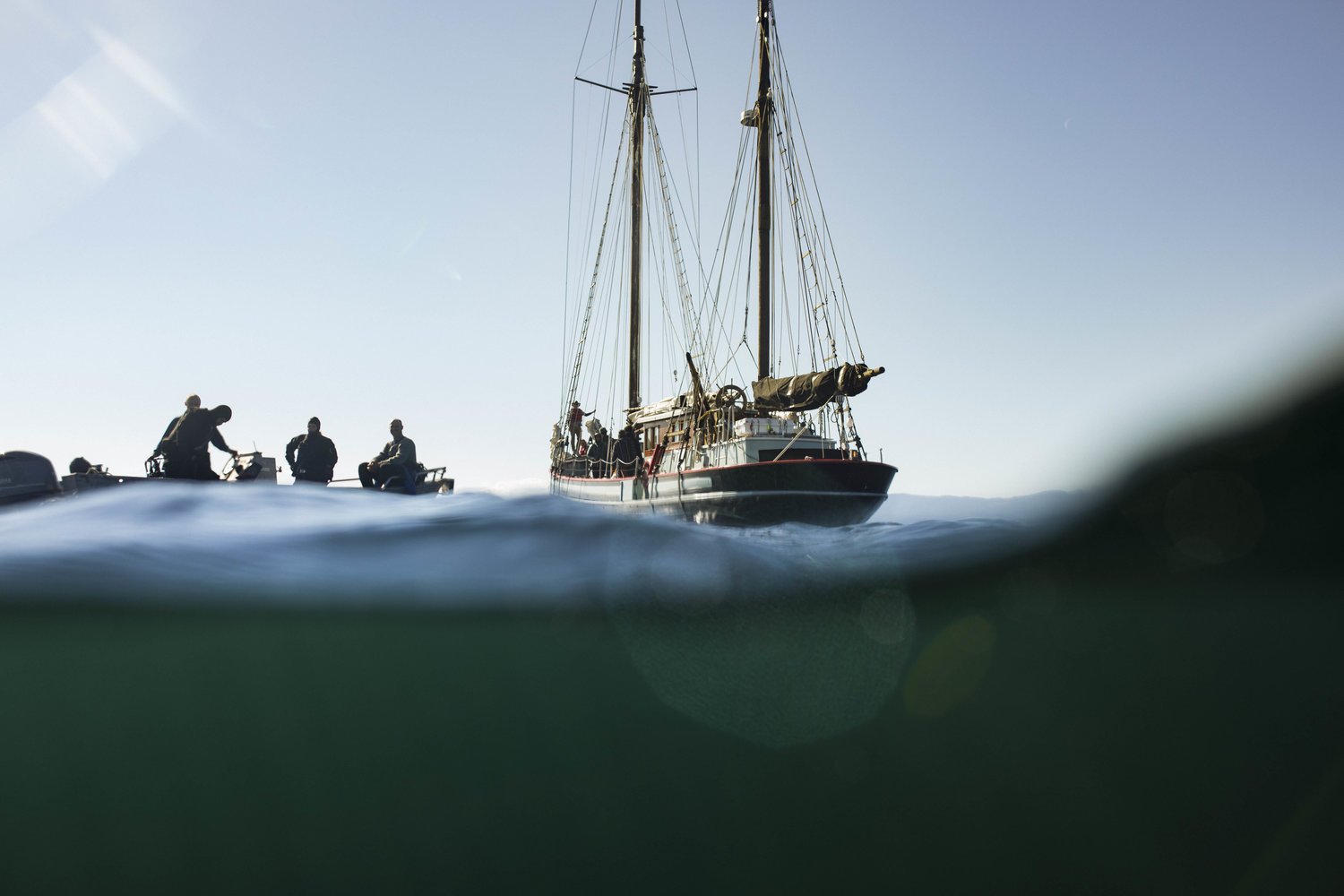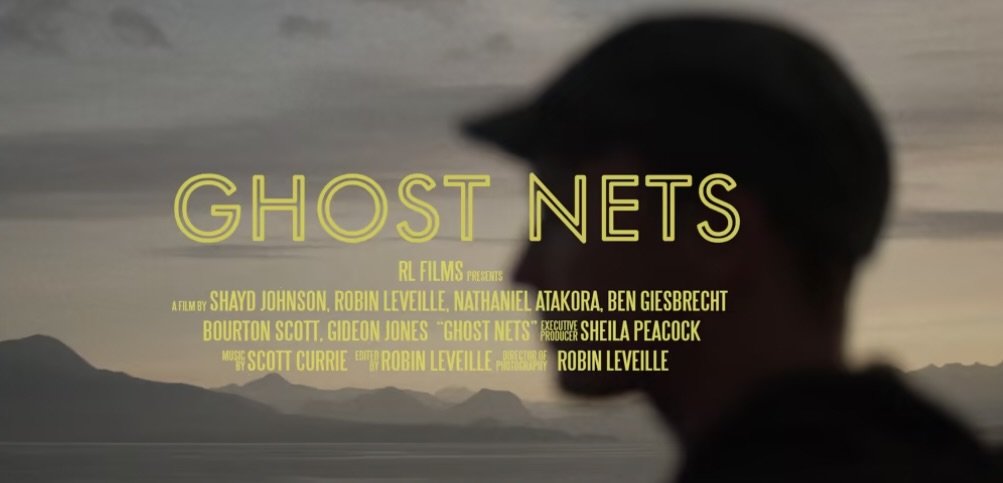
Emerald Sea Protection Society [ESPS] is a volunteer-run non-profit organization that is committed to the protection and restoration of sensitive marine ecosystems and coastal areas surrounding British Columbia. Started by commercial diver, Bourton Scott, ESPS focuses ongoing efforts on protecting marine life from the impactful effects of abandoned, lost or otherwise discarded fishing gear [ALDFG], otherwise known as ghost gear. Now in their fifth year of operations, ESPS initiatives include ghost gear research, collaborations, gear removal projects, education and capacity building with surrounding coastal communities.
Emerald Sea Protection Society
Ghost gear poses significant and damaging impacts to ocean life and thereby oceans ecosystems. From the surface level to benthic zone, ghost gear is stressing our oceans at an alarming rate; ESPS contributes to the solution. In 2021, the organization successfully removed over 32,000kg of ghost gear from BC waters and conducted eight surveys and 50 vessel days on the water either surveying, mapping or retrieving debris. Until 2021, ESPS was entirely self-funded and solely relied on donations to continue their work. Growth and collaboration has granted ESPS two paid part-time staff as of 2021.
Bourton Scott, founder of ESPS, established the non-profit as a means to carry out ongoing research and recovery projects to combat the impacts of ghost gear in BC’s coastal waters. From being a commercial diver for over a decade, Bourton saw firsthand the importance of protecting underwater environments along Canada’s Pacific Northwest, restoring the vastly unique and sensitive ocean ecology this coastline has to offer. Bourton built ESPS into a strong and successful team of likeminded conservationists.

“Bourton worked as a commercial diver for 15 years up and down the coast, he witnessed the culmination of gear and debris and how impactful it was”
Ghost Gear
Defined as abandoned, lost, or otherwise discarded fishing gear, ghost gear is a significant contributor to the destruction of our oceans and ecological habitats within. Ghost gear includes large fishing nets, lines, fish or crustacean traps, pots, rope and any other human-made devices used for fishing purposes. Vast amounts of fishing gear are discarded into the ocean annually due to rough weather conditions, being caught on rocks or reefs, or damaged by passing boat traffic. In certain situations, boats are forced to also deliberately cut gear in order to avoid dangers to the crew.
These anthropogenic debris vastly impact marine organisms by trapping and entangling species. Benthic zones are blanketed with gear which can impede the growth of bethnic organisms such as phytoplankton, kelp, coral, mollusks and algae. Coastal zones are littered with debris which impacts the health and wellbeing of coastal species and affects coastal tourism.
‘Ghost Nets’ is an ESPS documentary following Bourton Scott and the team on a behind the scenes journey of tackling Ghost Gear around BC’s coast. The film aspires to both educate and influence change to BC’s coastal waters.
ESPS’s Approach
4 pillars are focused on for combatting ghost gear;
Research
Surveys
recovery
education
Research
This integral stage involves gathering a strong database of accurate information regarding discarded fishing gear, often received by word-of-mouth and referrals. Data from different sources can help ESPS paint a picture of where to locate ghost gear. ESPS develops models to predict gear impact and location. The information is also shared with like-minded groups, helping the push of effective recovery efforts.
“A lot of research starts from community referrals...[such as from] divers, community members and officials who share ghost gear information and areas”
Location surveys are achieved with help from the ghost gear database. Gear predictions are thus tested via dive surveys, observing specific underwater sites to collect more accurate primary data. This stage is crucial for understanding the size and extent of ghost gear for recovery purposes. Dive surveys also help to gain insight on impacts of debris on various marine ecosystems.
Surveys
““[often during dive surveys, we] gather equipment, identify the location, safely anchor and send down remote operated vehicles to look around to find the exact location while continuously following safety protocols and guidelines””
Recovery
ESPS has conducted countless successful dive-recovery initiatives for ghost gear surrounding British Columbia’s coast. The structure of recovery missions involve a three person dive team, with larger recoveries requiring a hydraulic crane equipped to an ESPS vessel. Gear is lifted to the surface and into the boat. Once secured, awaits the next steps disposal. Gear is recycled, if undamaged and untagged, at Ocean Legacy’s recycling facility in various locations. Tagged gear can be returned to its owner via DFO (Department of Fisheries and Oceans).
2021 Statistics of ESPS’s largest cleanup, located in Britannia shipyard, yielded over 28,000kg of recovered ghost gear debris. In some instances, debris are too large a capacity to be successfully removed by ESPS. In these situations, it is reported to the GGGI data portal.
Ghost Gear Rapid Ecological Assessment Methods are conducted during pre- and post removal surveys, designed to guide decision making prior to ghost gear removals. Assessments are designed to provide a snapshot of the ecological damage caused by ghost gear. Removal of ghost gear, if not implemented correctly, can damage fragile reef structures, attached and entangled organisms. Pre-removal surveys can reduce risk of causing additional harm to marine species and habitat through the removal timing, methods and equipment used by the team.

““Recovery dives can take multiple weeks...depending on the [circumstances of the lost gear]...Nets tend to be the most impactful...[they] can still operate like [they] would if they were actively fishing. [Nets] are the main [type of ghost gear] we try to find””
Education
ESPS is motivated to continuously teach the general public on the many complexing issues of ghost gear. Education is exceptionally important, providing guidance on how to get involved, what to do if gear is found, and where ghost gear comes from. ESPS hopes, ‘to dispel misconceptions which often vilify fishers as the root cause of this problem’.
ESPS works with schools and often participates in community events. Blogs and social media are used as well for increasing public awareness outside BC’s zone. The education program includes classroom sessions, where recovered gear is brought into the class as part of the session. Community demonstration dives on local docks are additionally effective, and often collaborate with Surfrider.
Founded in 2015, The GGGI is the worlds largest ‘cross-sectoral alliance’ devoted to finding lasting solutions to issues regarding ghost gear and its environmental impacts. This initiative encompasses a broad and diverse group of participants throughout the fishing industry, private sector, government and intergovernmental organizations, NGO’s and academia. All partners play a strong role towards ghost gear mitigation. As an active member within the network, ESPS has access to the GGGI portal, gaining and contributing their data of ghost gear surrounding BC’s coastline.

















